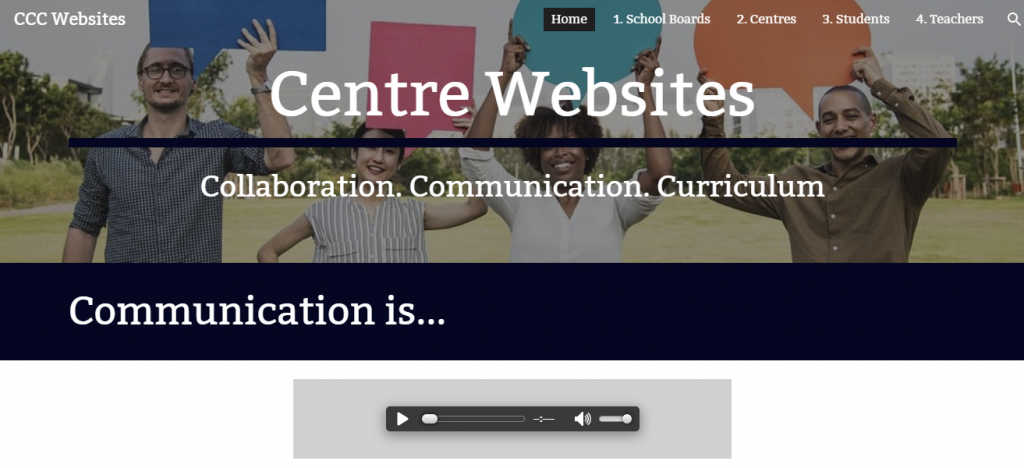Questions for reflection
How do you share information with your colleagues?
Where do you find information about the courses offered at your centre?
How do you collaborate with your colleagues to improve student learning?
Why are websites important for schools and centres?
On one level, websites are important places to communicate information about our school or centre with others.
- Potential students can find out about the programs and services we offer
- Current students can find out about special events, exam schedules, or who to talk to for specific issues.
On another level, when teachers collaborate on making a website, it takes on a different kind of importance. It can become a place where collective teacher efficacy is amplified.
What is Collective Teacher Efficacy?
Collective teacher efficacy is when teachers believe that, together, they can make an impact on student learning. It is more than just a “We Can Do It!” attitude, though. Collective teacher efficacy is belief that is grounded in theory or data about student learning – Jenni Donohoo states it simply as collaborative conversation based on evidence. John Hattie also describes it as a collective belief that teachers cause learning, not students.
What is “collective teacher efficacy?” from Challenging Learning on Vimeo.
John Hattie shares his thoughts on Collective Teacher Efficacy which is the new number one factor in Visible Learning.
#challenginglearning #evidenceofimpact #collectiveefficacy
Teacher websites at PACC
Shiela Sachdeva, pedagogical consultant at PACC Career Centre of the LBPSB, started a website to share information with the teachers in her school community.
It grew out of a specific need – when new teachers joined the centre, Shiela would spend a lot of time showing them where to find programs, centre policy, and other information. The website allowed her to create a one-stop resource centre for them and ultimately for all of the teachers.
Shiela chose to use Google Sites as their platform for the following reasons:
- to make it easier to integrate materials that already existed on teacher Google Drive accounts
- to have control over who could see what – some things are public, other things are restricted to centre staff.
- to increase the potential for collaboration on the site.
What began as a place for Shiela to share information with new teachers has become a place where the PACC teaching community can grow. Since it began during the 2017-2018 school year, more teachers are taking ownership over the website and are sharing their own teaching resources with each other through the site. Shiela is seeing increased collaboration as a result.
What is the impact on student learning?
The PACC teacher site that Shiela began is specifically teacher-facing. For now, much of the content is open only to the teachers at PACC in order to respect their comfort levels in terms of sharing with each other.
However, as more teachers share, comfort levels around sharing online are increasing amongst them. Some teachers are starting to share evidence-based practice through the website, such as resources related to Trauma Informed Practices and Literacy Strategies.
Based on this evidence, the teachers are starting to talk about different ways of sharing resources with their students. Within the context of increasing math literacy for students from diverse linguistic backgrounds, one of the teachers has begun to work with his students to create videos about math concepts in different languages spoken at the centre. Plans for the future are to begin pulling together all of the student-facing resources that teachers are already creating on their own into one centralized location – a student-facing website – to increase access for students.
Collaboration and sharing were already strong values at PACC. What this website has done has created a place where these values are visible and where staff members have immediate access to the fruits of their collaborations. The website is a centralized place for the teaching community to grow as they collaborate on their collective impact on student learning.
In January, 2019, Shiela and Tracy facilitated a workshop at the Rencontre nationale des gestionnaires et des responsables du soutien pédagogique en FGA called Centre Websites to Support Collaboration, Communication, and Curriculum. You can see their presentation as well as different examples of websites here:
Centre Websites to Support Collaboration, Communication, and Curriculum
Tracy Rosen wrote this article based on collaborations with Shiela Sachdeva.
Shiela is a pedagogical consultant at the PACC Career Centre of the Lester B Pearson School Board. She believes in the power of teacher collaboration to make change for students.


